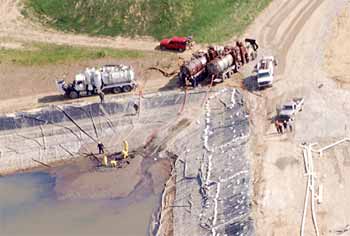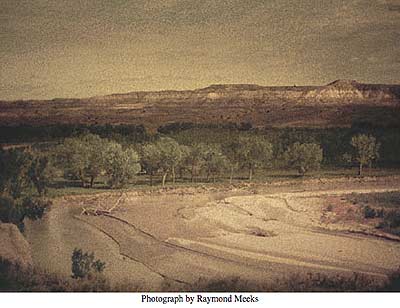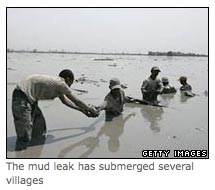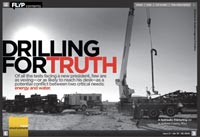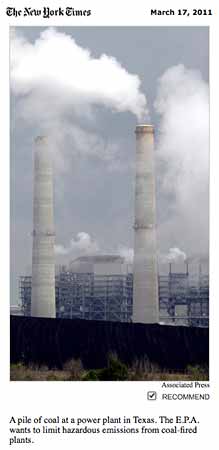Press
Europe's dash for gas is leading Halliburton, Chevron and Exxon to consider bringing hydraulic fracturing across the Atlantic.
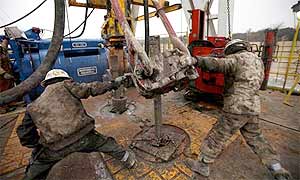
Workers at the Barnett Shale field of Fort Worth, Texas, where hydraulic fracturing technology is needed to release underground gas. Photograph: Robert Nickelsberg/Getty Images
Despite growing evidence from the US of a raft of negative environmental and social consequences of drilling for natural gas using the controversial hydraulic fracturing process, European energy companies are scrambling to secure licenses to roll out extraction projects this side of the Atlantic.
...Experts have increasingly expressed concern that the chemicals used in fracking may pose a threat underground or when waste fluids are transported or spilled.
...'Construction of pipelines could cause problems, but so could the construction of roads,' adds Kassenberg. 'If roads are built to transport water and gas then it will open up pristine countryside to mass tourism, and could bring an additional negative impact to the environment.'
See: France to Unlock Dirty Oil Under Paris With Texan Help
"Across vast regions of the country, gas companies are using a technology called hydraulic fracturing to produce natural gas from previously untapped beds of shale."
Fred R. Conrad/The New York TimesEnvironmental concern about hydraulic fracturing is creating political obstacles for gas drilling companies.
The most immediate hazard from the national drilling bonanza, it is clear, involves contamination of residential drinking water wells by natural gas. In Bainbridge, Ohio, an improperly drilled well contaminated groundwater in 2007, including the water source for the township’s police station, according to a complaint filed this year. After building to high pressures, gas migrated through underground faults, and blew up one house.
Here in Dimock, about 30 miles north of Scranton, Pa., 13 water wells, including that of Ms. Switzer, were contaminated by natural gas. One of the wells blew up.
Pennsylvania's natural gas drillers are still flushing vast quantities of contaminated wastewater into rivers that supply drinking water, despite major progress by the industry over the past year in curtailing the practice.
Photo: marcellus-shale.us
Under pressure from environmentalists and state officials, energy companies that have been drilling thousands of gas wells in the state's countryside spent part of 2010 overhauling the way they handle the chemically tainted and sometimes radioactive water that gushes from the ground after a drilling technique known as high-volume hydraulic fracturing, or fracking.
Until the second half of last year, Pennsylvania had been the only state to allow most of this wastewater to be discharged into rivers after only partial treatment. Other states required most or all of the brine to be disposed of by injecting it deep underground.
In recent months, though, the industry has boasted big gains in the amount of well wastewater that is reused, rather than trucked to treatment plants that empty into rivers and streams.
See: Articles on Fracking waste water.
See: Pittsburgh’s drinking water is radioactive, thanks to fracking. Only question is, how much?
Daniel Gilbert. "Underfoot, Out of Reach: A series on the conflicts over Southwest Virginia's natural gas wealth." Virginia Tri-Cities.com. (online).
Beneath the surface of seven Southwest Virginia counties lie pools of natural gas worth more than a billion dollars a year. Some of this gas belongs to landowners forced by the state to lease their mineral rights to private energy corporations to develop. But instead of putting royalties into the pockets of mineral owners, the state funnels thousands of dollars every month into an escrow fund that royalty owners cannot monitor or access without clearing enormous legal hurdles.
While the system has vastly expanded production of natural gas in Virginia, it has devoted scant resources to ensuring that companies make the required payments into escrow, which in recent years has ballooned to more than $24 million. The result is that companies can produce gas for years without ever filing the necessary paperwork for royalties to be escrowed, and virtually no one notices that hundreds of individual accounts in escrow each month receive no deposits even though the corresponding gas wells are producing gas, a Bristol Herald Courier investigation finds.
To view the special program "The Paper that Made a Difference", produced by WJHL 11Connects, click here for part one, and here for part two of the program.
Articles in this series:
Part Three: The Virginia Supreme Court Weighs In
Part Four: Coal Goes on the Offensive
Part Five: From Crisis to Sustained Loss
Part Six: What is Missing from Escrow?
Part Seven: An Audit Long Delayed
Part Eight: Sue, Split or Do Nothing
Dig Deeper:Resources and links for more information
Do I have money in escrow? How to use our database and determine if you may have money in escrow.
View the members of and contact information for the Virginia Gas and Oil Board
Graphics:
Hydraulic Fracturing
Bristol Herald Courier
How Forced Pooling works
Search our Database for information on escrow accounts, with balances each month, current to March 2010.
See: Tom Vanderbilt. "Paper Trail." Time. Feb. 14, 2011.
Powder Keg
The gas industry has been busy in Wyoming's prairies and grasslands, building thousands of miles of roads and sinking more than 10,000 wells in the past three years. But in the Powder River basin, ranchers are joining environmentalists to try to still the drills.
See: C-Span Book TV Oct. 2, 2004. Bushwacked: Life in George W. Bush's America. Chapter: "Dick, Dubya, and Wyoming Methane." (152)
BBC. January 24, 2007. A mud flow that has displaced thousands of Indonesians was most probably caused by gas drilling, scientists say.
See: Davies, R. J, R. E Swarbrick, R. J Evans, and M. Huuse. 2007. "Birth of a mud volcano: East Java, 29 May 2006." GSA Today 17, no. 2: 4–9.
See below: Hardiyan Digwiyono. (2006). "Children in the Hot Mud Volcanoes". YouTube.
Watch the related videos that follow this one minute film.
Abrahm Lustgarten. Flypmedia. Issue 21. January 16-29, 2009. "Drilling for Truth". Page 11.
Includes photos, graphics and videos.
Experimental Flash based interactive online magazine. Last updated Fall 2009. On April 19, 2010, Flyp announced that it will close.
See: Drilling Wastewater Disposal Options in N.Y. Report Have Problems of Their Own - ProPublica
WASHINGTON — The Environmental Protection Agency on Wednesday proposed the first national standard for emissions of mercury and other pollutants from coal-burning power plants, a rule that could lead to the early closing of a number of older plants and one that is certain to be challenged by the some utilities and Republicans in Congress...
Lisa P. Jackson, the agency’s administrator, said control of dozens of poisonous substances emitted by power plants was long overdue and would prevent thousands of deaths and tens of thousands of cases of disease a year.
Ms. Jackson pointedly included the head of the American Lung Association and two prominent doctors in her announcement to make the point that the regulations were designed to protect public health and not to penalize the utility industry.
Photograph: Jonathan Ernst/Reuters
Public health advocates said utilities had delayed the rules for more than two decades with court challenges and lobbying campaigns.
“If you think it’s expensive to put a scrubber on a smokestack, you should see how much it costs to treat a child over a lifetime with a birth defect,” said Dr. O. Marion Burton, president of the American Academy of Pediatrics, who stood with Ms. Jackson in announcing the rule.
Oddly, when the story first ran, it included an account of how Ms. Jackson invited a group of second graders from a nearby elementary school to the announcement. Earlier today, Mar. 17, it was edited out. Was it Broder and Rudolf, or the Times? Are children not newsworthy?
"She invited a group of second graders from a nearby elementary school to attend the rule’s unveiling at her agency."
I found a mention of it in a cached Google listing.
Why did the Times delete it? The article as it first appears will always be located here. (PDF). The Google cache will expire as soon as you read this. See for yourself, read between the lines.
(Neil Zusman, 2011-03-17).
Cornell Daily Sun Editorial. Published: 2/16/10.
Peter Meinig, chairman of the Cornell University Board of Trustees and former associate of a large natural gas company, is at the center of many competing interests, and should not participate in any decisions the University makes regarding leasing land for natural gas drilling.
...In order to reach the most appropriate outcome for Cornell, and for the University to remain above reproach and second-guessing by the many interested parties, Meinig should recuse himself from all decisions and discussions regarding the leasing of land for natural gas drilling.
New York Times Editorial. Published: October 16, 2009.
Regulators must amend the rules to bar drilling in the New York City watershed: a million acres of forests and farmlands whose streams supply the reservoirs that send drinking water to eight million people.
Accidental leaks could threaten public health and require a filtration system the city can ill afford...“fracking” has been implicated in hundreds of cases of impaired or polluted drinking water supplies in states from Alabama to Wyoming.









